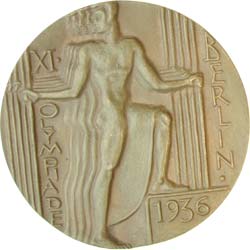
Summer Games: Previous | Next
Return to main page / index of medals.
Return to Eric Holcomb Company home page.

1936 SUMMER OLYMPIAD
BERLIN, GERMANY
DESCRIPTION
There were four different foundries that produced 5,000 medals each. The result was four different bronze compounds cast with the same design. The obverse depicts the outlines of five athletes (representing five participating continents) pulling ropes to ring the Olympic bell. The legend XI OLYMPIADE BERLIN 1936 is inscribed in vertical fashion. The reverse displays a concentric circle pattern and the Olympic Bell with a German eagle holding the Olympic rings. The medals were presented in round red cardboard boxes with the Olympic bell imprinted on the cover.
THE GAMES
The 1936 Olympics are best remembered for Adolf Hitler's failed attempt to use them to prove his theories of Aryan racial superiority. As it turned out, the most popular hero of the Games, even among the German people, was the African-American sprinter and long jumper Jesse Owens, who won four gold medals. During the long jump competition, Owens' German rival, Luz Long, publicly befriended him in front of the Nazis. 1936 saw the introduction of the torch relay, in which a lighted torch is carried from Olympia to the site of the current Games. The 1936 Olympics were also the first to be broadcast on a form of television. Twenty-five large screens were set up throughout Berlin, allowing the local people to see the Games for free. Basketball, canoeing and team handball made their first appearances, while polo was included in the Olympic program for the last time. Thirteen-year-old Marjorie Gestring of the United States won the gold medal in springboard diving. She remains the youngest female gold medalist in the history of the Summer Olympics. Inge Sorensen of Denmark earned a bronze medal in the 200-medal breaststroke at the age of 12, making her the youngest medalist ever in an individual event. Hungarian water polo player Olivier Halassy won his third medal despite the fact that one of his legs had been amputated below the knee following a streetcar accident. Rower Jack Beresford of Great Britain won a gold medal in the double sculls event, marking the fifth Olympics at which he earned a medal. Kristjan Palusalu of Estonia won the heavyweight division in both freestyle and Greco-Roman wrestling.
Additional Photos